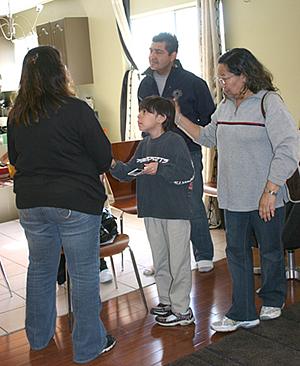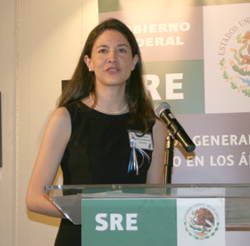Latino Parents With Autistic Children Face Major Hurdles
Early diagnosis of autism is crucial but it is also a diagnosis that parents dread and that can lead to finger pointing and family stress. But parents will tell you early diagnosis is just the beginning of a struggle for intervention, that's much harder if you don't speak a country's dominant language.
"Latino Parents With Autistic Children Face Major Hurdles" is a three-part special report.
Part 1. Latino Parents with Autistic Children Face Major Hurdles
Part 2. Autism, the Risk of Doing Nothing
Part 3. Know Your Rights, To Better Advocate for Your Child.
This article is also available in Spanish.

Josefina Nieves is nervous. Her son Nestor is graduating from high school this semester and will soon be leaving for college. Nestor was diagnosed with autism at age two and half.
For Spanish-speakers, accessing information and resources is difficult and making time for therapies can be a challenge, yet Nieves, a single mother, is managing to raise not only one son diagnosed with autism, but two. Her teenage son Daniel also has the disability.
Beside her can-do attitude, however, Nieves speaks English as well as Spanish and is computer and Internet literate—all abilities that give her an advantage accessing resources that can help improve her sons' opportunities, and quality of life.
She also has the advantage of being an employee of Lincoln Heights' based Fiesta Educativa, a non-profit group that educates parents about their rights, resources and about the disability.
When Nestor was diagnosed back in the mid 1990's, the doctor told Nieves to lower her expectations: he would never talk, never get a job or get married.
"Who do you think you are to tell me that my son's life would amount to nothing?" Nieves says she would like to ask that doctor now.
But Nieves' "advantages" are not the norm.
Understanding what a diagnosis of autism means is difficult no matter who you are, but if you happen to be Latino, only speak Spanish, are illiterate or have little formal education, or not Internet savvy, the difficulties are significantly greater.
Highland Park resident Ana Brizuela’s son is a senior at Franklin High School and has autism. She says her son receives services for his disability through the school district, but not through the Eastern Los Angeles Regional Center that locally offers services to people with a wide range of developmental disabilities. That's the same center she claims misdiagnosed her son years ago with Attention Deficit Disorder, when the autism spectrum disability was not as well known.
"When my son was little I knocked on a lot of doors and I didn't get any help," she tearfully said in Spanish during a parent workshop in February hosted by Fiesta Educativa.
Brizuela is worried there is no safety net for her son as he enters adulthood.
 Latinos and Autism
Latinos and Autism
Autism, a term used to describe a group of complex developmental brain disorders, is being called a pandemic by some public health officials.
According to new figures by the Centers for Disease Control (CDC), one in 88 children have been diagnosed with the disability. The prevalence rate is up from 1 in 110 in 2006, and 1 in 150 in 2002.
One in 54 boys has been diagnosed with autism, that's four times higher than girls with only 1 in 252 girls receiving the diagnosis, according to the CDC.
At the same time, Latinos are the fastest growing segment of the US population. From 2000 to 2010, the Hispanic population in California grew by 27.8 percent, according to the 2010 Census. More than 4 million Hispanics live in Los Angeles County alone, according to the 2010 census data.
But the CDC's latest prevalence study does not include data from California.
"Autism is an epidemic. We never thought that autism would be as high as we are currently seeing, so it is an epidemic," Dr. Carolina Peña-Ricardo of Children's Hospital said in Spanish during a recent parent conference at the Mexican Consulate where Nieves also spoke.
The California Department of Developmental Services (DDS) has calculated a 70 percent increase in autism cases in the state from 2002 to 2007, and the number of Latino children with autism is increasing at a similar rate of white children, according to Dr. Peña-Ricardo.
In 2001, the CDC reported that Latinos report less concerns of developmental delays to their pediatricians, Peña-Ricardo said. She believes that could be one the factors lowing their numbers, but noted there are no studies that show this as a fact.
The spectrum disorder, which varies from child to child in severity, causes significant social, communication and behavioral challenges and in less severe cases those issues can be alleviated with intervention. Early intervention, by age three, is considered critical.
But knowing if you need to seek help is not easy.
Autism Speaks, But Does It Speak Spanish?
While organizations like Talk About Curing Autism (TACA) and Autism Speaks provide some information in Spanish, the information is not readily available in the community.
"A lot of the pamphlets we have are in English and we try to get as many as we can in Spanish but it's [just] not there. It's not there," said Angelica Herrera, a parent coordinator at Fiesta Educativa.
The Eastern Los Angles Regional Center (ELARC), one of 21 private non-profit organizations under contract with the California Developmental Services (DDS) to coordinates services to people with developmental disabilities, serves the East Los Angeles and surrounding cities.
Sixty-nine percent of ELARC's 9,000 clients are of Hispanic descent, and 2,000 have autism, according to ELARC Executive Director Gloria M. Wong.
A quarter of the autistic clients, of all ages, come from monolingual Spanish-speaking homes, Wong said.
ELARC and the Los Angeles Unified School District are the main sources of services for local children, but resources, funding, at both institutions are strained.
Centro Estrella Family Resource Center, run by non-profit Alma Family Services in unincorporated East Los Angeles, outreaches to parents using word-of-mouth and to community organizations through established relationships.
"It's a lot harder when you're a monoligual Spanish-speaking family and both parents work and don't know what resources, or when they get the resources, or how much to ask for," said Lourdes Caracoza, the center's director of program operations. The center offers socialization programs and numerous other services considered key to helping children with autism thrive,
While autism greatly affects the Latino community, Fiesta Educativa's Executive Director Irene Martinez says families are not getting all the information available.
"Partly it has to do with language, most of the information out is in English, most of the conferences, most of the trainings," she said.
Lack of familiarity with institutions and how to navigate them, as well as immigration status also creates barriers for immigrant families.
"Sometimes they are afraid, it's an element. For the most part the children are born here but the parents are not so they are afraid they are going to get into some legal difficulties so that holds them back from getting the services they have a right to, by law. So it's a reality. We are trying to break down those barriers but situations like this make people more uncomfortable to come in and get more information," Martinez said.
Nationwide there aren't many resources for people of color regarding autism and even less for monolingual Spanish speakers, says Gloria Perez-Walker, parent advocate and host of the radio show "Special Ed For Busy Parents."
"Even though autism is exploding in the US, the fact is the voices and access for services for Latinos is very minimal. I get clients who are told there 'are no services' for their child, or they are pushed into segregated settings for their child with autism, which limits their future ability to live independently, forget about actual employment," Perez-Walker told EGP.
Angelica Herrera is a parent coordinator at Fiesta Educativa and works directly with parents like Brizuela, but says attendance at their monthly parent meetings is dismal. Herrera says she's happy when five parents show up, but too often no one attends.
"Getting the word out has been a challenge," Herrera told EGP.
And for many Latino parents, acknowledging that their child might have autism in the first place can be an overwhelming and confusing undertaking, better left in the dark.
Next week Part 2—Major Hurtles for Latino Parents With Autistic Children; The Risk of Doing Nothing
This story was produced in collaboration with the USC Annenberg/California Endowment Journalism Fellowships program.
Article also published in New America Media.

